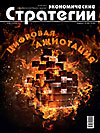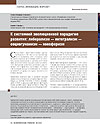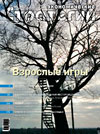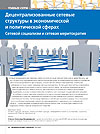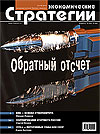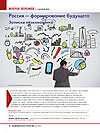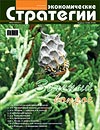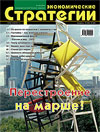Network Structures: Options in Living Nature and Human Society. Network Socialism
Decentralized, distributed network structures possess significant creative and innovative potential in solving various problems of modern society, including organization of interdisciplinary creative laboratories, interactive techniques in education and the establishment of inter- and intrafirm networks. Of special interest are biological models (paradigms), i.e., organizational options for network structures in diverse biological systems. These models can be used creatively to establish networks in various spheres of human society. It is emphasized that the dissemination of network structures in society promotes the implementation of the principles of socialist economy.
Decentralized network structures in economic and political spheres
Network nonhierarchical structures have sufficiently significant potential in business, where they correspond to strategic alliances between firms, inter-firm networks of its autonomous departments, as well as to small network companies, the typical example of which is represented by manufacturing cooperatives. Not less prospects characterize decentralized networks in the political sphere, where we see such important examples as inter-state network alliances, cross-border and global network organizations and movements, advisory commissions and committees under the state apparatus structures and especially network structures being part of the largely non-hierarchical civil society, expressing the citizens’ will and interests in their dialogue with the political system’s hierarchy. On the basis of presented facts the author makes a conclusion that networks in economy contribute to implement the principles of self-managed socialism, and in political sphere – to implement the principles of new type meritocracy, which will be supported by civil society network structures.
Russia — Shaping the Future. Remarks by a non-economist
Many different opinions on the prospects of the Russian economy were expressed by the last economic year results: from restrained-optimistic to very pessimistic ones. At the Davos forum our representatives (from government and big business) as usual (learned) in a businesslike tone not admitting objections were speaking for some reason to the whole world about the internal developments of the Russian Federation and the problems, which are not of interest to anyone but ourselves. It is practically impossible to draw up conclusions from these statements about how we will ensure sustainable development and what role we define for Russian economy in the world economic system. Nevertheless, let’s look at the situation from a viewpoint of non-economist.
Globalism — a Multi-Polar World: the Future or the Past?
The Great Spirit of Capitalism woke powerful creative forces of man. But at the same time it released the demons of personal success and enrichment, sworn by world religions. And along with the great human achievements they caused new disintegration of society into slaves and masters.
Globalism — a Multi-Polar World: the Future or the Past?
Were it not for the Russian nation and the Russian nationalism, there wouldn’t be not only Pushkin, Esenin, Vysotsky, but neither Dostoevsky and Tolstoy, so beloved in the West.


